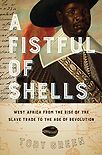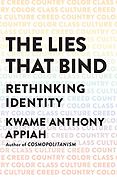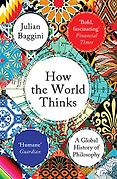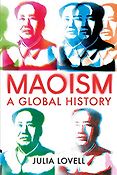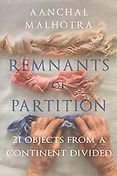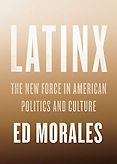We’re talking about the books on the shortlist of the British Academy’s Nayef Al-Rodhan Prize, which celebrates books that promote ‘global cultural understanding.’ Can you tell us a bit what that means and why it’s important enough to set up a book prize about it?
We are living in times when it is common to think of ‘identity’ and ‘belonging’ in preconceived ways, as given by the distinctions—perhaps the myths—of country, race, class and religion. Thinking along these lines has become really quite dangerous, because it’s leading to the vilification and indeed harm of people considered to be on the outside of these divisions—particularly with the escalation and greater prevalence of a politics of resentment and national disengagement.
Yet, on the ground, cultures and identities are constantly on the move; they’re mixed, and they cross borders. Our affiliations de facto are plural because of our social engagements and mobility, because of our consumption and travel, because of global interaction. If you look further back, human history itself is actually a history of shared needs and aspirations, common ideals and philosophies, and an awful lot of cultural borrowing and exchange.
“I would like to convince people who think otherwise that to be of a wider world actually is not a threat to national and local identity”
So it’s wonderful that the neuroscientist and international relations scholar Nayef Al-Rodhan has had the wisdom to establish a generous prize for an original, rigorous and accessible book that uncovers our common ground and promotes cultural understanding. Each year, it goes to a book that explains conflicts and disagreements around the world, reveals our shared histories, and shows how ideas and beliefs are transmitted across the confines of borders and ages. It should be a book that enchants us and compels us with new, different stories of cultural crossing and borrowing.
This is why this prize is so important for us: because of our current times and our current politics, it’s crucial that we have a prize that rewards books that enhance global cultural understanding.
But what do you say to, for instance, those British people who feel threatened by multiculturalism, or Americans who feel immigration is undermining their way of life? Aren’t their feelings real?
They are absolutely real, but I would invite the sceptics to consider that our cultural bearings are never homogeneous. Whether we like it or not, each one of us is made up of multiple identities. Having an openness to the world—dare I say a cosmopolitan way of thinking—doesn’t necessarily pose a threat to our deeply held views. I would like to convince people who think otherwise that to be of a wider world actually is not a threat to national and local identity, to strongly held affiliations of race, nation or class. My thinking here is that it’s not a question of either/or, but of and.
The first book on the 2019 shortlist of the Nayef Al-Rodhan Prize for Global Cultural Understanding is a very good exploration of this. This is The Lies that Bind: Rethinking Identity by Kwame Anthony Appiah. Tell me a bit about that book and what it tells us about identity.
The Lies that Bind is a most timely book. Anthony Appiah wrote the book on the back of his Reith Lectures, which were informed and stimulated by the vexed politics of our times. It tackles deeply-etched senses of identity and belonging, based on presumptions of class, race and nation. In the book, Appiah—with his characteristic wisdom, good humour, and liberal good sense and so many rich historical tales from around the world and from the past—asks us to interpret identities not as pre-given, or monolithic or unchanging, but instead as shaped by our own rich and often contradictory experiences as human beings. He’s getting us to think about identity and belonging through the multiplicities that we inhabit and that we have to engage with, and as a kind of challenge, as opposed to a pre-given.
The book for us is really quite compelling because of its erudition. The writing style is magical. It’s very clear. And the argument, in its own right, is vital for what I would call our identitarian times.
He draws on his personal experience as well, doesn’t he? He’s such a citizen of everywhere, with parents from different continents and then a posh British accent. He describes at the beginning of the book how people can never place him.
Yes, and one might be tempted to think that, coming from a privileged background, he can afford to be cosmopolitan, and that such cosmopolitanism runs in his blood. But I think the beauty of the book is that he says, ‘Well, in actual fact, we’re all like this. We are all the product of multiple affiliations and attachments and moorings.’ That’s what makes it really compelling. Quite apart from the revelations of his own biography in the book, there are so many other rich examples from around the world. His awareness of the detail of what goes on in the past and elsewhere in the contemporary world is really quite extraordinary.
What does he mean by “the lies that bind”? Does he mean that these identities are important to us as human beings, they give us a sense of belonging, but in fact they’re just constructs?
He’s saying that the way in which we’ve come to think of identity—along the lines of divisions of class, race and nation—are based on a whole series of fictions and myths that don’t actually map onto reality, in terms of how lives are led. But they are passionately held, which is why unmasking the lies and their affective grip is so important.
Let’s look at the next book on the Nayef Al-Rodhan prize 2019 shortlist, which is Julian Baggini’s book on How the World Thinks. He’s a philosopher who’s been educated in the Western tradition, but this book is his exploration of all the other philosophies out there and what he makes of them.
That’s right. How the World Thinks sets out to provide a map of human thought in different regions of the world by looking at the composition and the impact of certain founding philosophies: Greek, Hindu, Buddhist, Confucian and Islamic. He also touches on certain oral traditions, especially in Africa. He wants to look at the impact of these founding philosophies on the development of ways of thought.
What he reveals are the commonalities but also the differences in thought and belief. He shows why worldviews that can appear strange or anomalous to others are as they are because they’re rooted in particular philosophical precepts. Part of his project in How the World Thinks is to say, ‘Look, philosophy really matters. Philosophy is not part of a dry world of abstract erudition. Philosophical ideas make their way through into religion, into systems of beliefs, into cultural habits and so on.’
Five Books interviews are expensive to produce. If you're enjoying this interview, please support us by donating a small amount.
I think this book is an achievement in several ways: as a bringing together of a number of world philosophies, as an illustration of why philosophy matters for global understanding, and as a bridge between Western and Asian thought. He shows us that there are very strong commonalities, but that where differences exist—between, say, warring Muslims and Hindus or warring Christians and Muslims—there are reasons rooted in a clash of worldviews.
So How the World Thinks is a book in which the erudition is deep, that’s very clear and immensely relevant.
Is there a particular example from the book that demonstrates these clashing worldviews?
One very general example is that the Western philosophical tradition—from the Greeks to the Enlightenment—is centred around the rational individual, while most Asian philosophies place the individual at the heart of a much wider cosmos where the individual is, to a degree, decentred. Even more importantly, there is as much weight given to reason as there is to faith or belief. He invites us in the West to say, ‘Let’s try and understand other parts of the world and get to the bottom of why people think the way that they do.’ And of course, as a philosopher, he’s rightly saying that we should look at their philosophical precepts.
Let’s go to the next book on the 2019 shortlist of the Nayef Al-Rodhan Prize for Global Cultural Understanding. This is a book about the history of West Africa, A Fistful of Shells by Toby Green. This is a fascinating book, isn’t it?
A Fistful of Shells is groundbreaking. The author, Toby Green, draws on years of work in the archives—consulting written and oral histories, art, maps, and artefacts—to tell a completely different story of pre-slave and pre-colonial Western Africa. It is an eye-opener for anyone who thinks that the coastal regions of North and West Africa were closed, sedentary or “backward” prior to the 18th and the 19th centuries.
Green shows, through the extraordinary research he has done, that these West African kingdoms were confident, cosmopolitan, economically advanced, trading far and wide—with the West and beyond—and culturally sophisticated (hence his interest in looking at artworks and the archaeological archive as well).
Five Books interviews are expensive to produce. If you're enjoying this interview, please support us by donating a small amount.
What he argues is that the two-way connections between this region and Europe were immensely strong, worked to mutual benefit, and were reflective of the sophistication of the West African economy around copper, gold, cowrie shells, and all forms of industry and manufacture.
But all of this begins to fracture and come apart—very much to the detriment of the West African kingdoms—as a result of the imbalances of slavery and colonial extraction. It’s at that point when the kingdoms are selling slaves instead of selling gold that the imbalances in trade and in the balance of payments arise, because what the West is getting is far more valuable than what the West African kingdoms are receiving in return. It has become a skewed trading system.
He also shows that later on, as we enter into the colonial period, much of that very rich, secular history of civilization—of trade, of confidence—comes apart. It begins to be undermined.
How brightly, how wonderfully this book dispels myths about the so-called ‘Dark Continent’ and its ‘enlightenment’ from the West!
It’s also a bit of a warning against globalisation, isn’t it? These West African kingdoms participated quite actively in trade but it ended very badly for them.
It’s not an argument against globalisation, if we take globalisation to mean international connections and engaging in global trade. It’s an argument against the terms on which globalisation unfolds, who sets the rules and to whose advantage. It’s a defence of global trade, but a rejection of the skew and hidden power plays behind global trade that end up rewarding the rich and powerful and not others.
Next on this list of books promoting global cultural understanding we’ve got Julia Lovell’s Maoism: A Global History. Tell me about this book, and why it’s been picked by the judges of the Nayef Al-Rodhan Prize.
Maoism by Julia Lovell is another towering book. It offers a rich and brilliantly researched history of an important world ideology. At least, at the end of this book, you come to realise that Maoism is a truly important world ideology.
Lovell re-evaluates Maoism by showing how internationalism lay at the heart of it. The Maoist experiment wasn’t about closure, but about supporting all manner of anti-colonial, anti-imperial, nationalist liberation movements around the world.
“The Maoist experiment wasn’t about closure, but about supporting all manner of anti-colonial, anti-imperial, nationalist liberation movements around the world”
The book looks at how Maoism was taken up in different countries and the many regions around the world that were influenced by it. The 1968 movement in Europe and America, the political struggles in Peru, Vietnam, Cambodia, Tanzania, South Africa, India and Nepal all turned to Maoism.
Very interestingly, she notes that much of this happened at a time when Russia was in the ascendancy. It was beginning to open up a bit more under Khrushchev. But it was not seen—by anti-capitalist and liberation movements around the world—as the appropriate state system or political philosophy to pursue. Instead of Marxism, they turned to Maoism.
The book gives us all the details of the individuals, the leaders of those countries, who were enchanted by Mao and Maoism. Lovell writes about their travels to China and veneration of Mao. Many of them were bowled over after they’d met Mao. She also writes about the support that the Chinese gave—financial, engineering, sometimes military—to all these movements.
The book is of course honest about the oppression that followed from Maosim both in China and abroad—like the Khmer Rouge in Cambodia and the Sendero Luminoso in Peru. But the book is equally true to the passion for Mao and Maoism felt within many anti-colonial struggles around the world. It’s all too easy to caricature it today, but it explains a quest for change in China and abroad.
Lovell provides an astounding and close-up portrayal of a protagonist and a political ideology that changed the world and shaped China’s internationalism. If you scan the world after the post-war period and especially after the 1960s, you have to marvel at how influential Maoism was.
In 1989 I took a gap year after high school and was teaching at a school in rural Zimbabwe. In history, I had to teach the kids about Mao, I suppose because Mao had inspired Robert Mugabe and the ZANU-PF.
Yes, and when I was finishing my ‘O’ levels in an East London School in 1971, The Little Red Book was everywhere. It was quite extraordinary.
In the book, Lovell does talk about Mugabe and ZANU-PF. The ties were very strong. There was a fervent belief in the values of Maoism, the ideas of continual revolution, of maintaining constant vigilance, of enacting a cultural revolution. It was about not going down the industrial pathway in the way that Russia had done, but introducing a form of rural socialism. It was also very avidly taken up through Ujamaa in Tanzania. These ideas were underpinned by a huge amount of moral and material support from China and that explains quite a lot.
The book is 600 pages, but you’re compelled to read all of them.
How did China ended up so closed, then, by the time of Mao’s death? When Deng Xiaoping came to power, it was all about reforming and opening up a closed China. How does that sit with the internationalist angle?
What Lovell argues is that there was never that much closure. During the Maoist period, the Chinese state purported to be relatively closed off, but it wasn’t—that’s what she’s saying.
She also argues that after Mao, internationalism continued, but it changed as well. In the book, she traces connections between Maoist internationalism and China’s current internationalism under Xi Jinping in a very subtle and interesting way. He is closer to Mao than his predecessors have been, and there is a revitalisation of Mao and Maoism going on in China. But it’s a new form of internationalism which is much more about helping developing countries build their infrastructure and providing expertise—rather than fomenting Maoist struggle and anti-capitalist revolution.
But the line of reasoning is that what we see today is part of an old internationalist story.
And of course, in terms of contemporary relevance, Mao’s portrait still hangs over Tiananmen Square right in the heart of Beijing—or it did last time I was in China.
It does. I was in China last summer and he’s still there on full show.
Our exploration of global cultural understanding now moves to the Indian subcontinent. The next book on your shortlist is Remnants of Partition: 21 Objects from a Continent Divided by Aanchal Malhotra. This is another book with a strong personal element.
Remnants of Partition is a very poignant book. Through intimate conversations with survivors and their memories, unlocked by treasured items that they carried across the new border in the flight from India or Pakistan in 1947, Aanchal Malhotra recovers the buried emotions and traumas of Partition. She also tells the stories of her family, torn apart by Partition.
What’s interesting is that the stories of pain, rupture, violence, chaos and displacement are pretty well known, but the deeply personal reflections of individuals on both sides are not. These are stories of cross-border longing and connections that are made utterly senseless by the division. She speaks to people from varied backgrounds and once their memories are jogged by these rather touching objects they bring out—whether cooking utensils, or a shawl, or books—the individuals are thrown back into that time. The objects and the interviews unlock traumas that had been long buried. Amidst the tears when the stories are narrated, you find that to all these individuals who were young people at the time, Partition made no sense whatsoever, because Muslims and Hindus lived in harmony with each other.
“After Partition some have gone back to India or to Pakistan to visit family and they ruefully ask, ‘Why did this have to happen? Are we not one people? Are we not one nation?’”
The book also shows (again through interviews and conversations) that for most of these individuals, it still doesn’t really make sense in the here and now. After Partition some have gone back to India or to Pakistan to visit family and they ruefully ask, ‘Why did this have to happen? Are we not one people? Are we not one nation?’
What she does in this book, very eloquently and poignantly, is restore the everyday to one of the great dramas of the 20th century. She hauntingly brings together the oneness of people separated from kith, kin and place.
And the portraits are full of weight. Of course, they make you cry—but there are also a lot of funny, humorous sentences in the book. The portraits are full of nuance and wisdom. Her method of drawing on material culture to delve into memory and identity is very clever.
We talked at the beginning about the importance of these books in the current political climate. That’s particularly true in the case of this book, given the situation in India and Pakistan today.
Yes, and not just because of Kashmir. For quite a while now, in India, Hindu nationalism has been very much in the foreground. Politicians speak quite openly and categorically of India as a Hindu nation and that speaks volumes to the very many millions of Muslims in India and to India’s Islamic neighbours. And we have exactly the same happening on the Pakistani side.
So yes, this small but very significant book. Were it to get the publicity it absolutely deserves in India and beyond, it would help to set the record straight and show that “the lies that bind” are actually lies that blind.
Let’s move on to the last book on the 2019 shortlist of the Nayef Al-Rodhan Prize for Global Cultural Understanding. This is Latinx: The New Force in American Politics and Culture by Ed Morales. Tell me how this book fits in.
Across the books we’ve shortlisted this year runs the theme of the everyday, which always crosses and rubs up against the categorical and the ascribed, which is always a bit of an enclosure. So it is with Latinx by Ed Morales. He calls it Latinx because he wants to user a gender-neutral term to describe Latinos and Latinas in North America.
But he’s not blown away by the term, is he? He writes at the beginning, “for all Latinx’s space-age quirkiness, the term has a technocratic emptiness to it that can make it hard to warm up to.” He also points out many people are unsure how to pronounce it.
Yes, he says in the introduction that it is a much-contested term and that people have criticised it from all sorts of different angles, but he still wants to cleave to it.
What the book does—again with a lot of rich historical material—is question the staple of thinking in America: thinking through the filter of white and black. The book does that by delving into the identity formations and the cultural quest of the 17 per cent of America’s population that comes from Hispanic backgrounds.
Get the weekly Five Books newsletter
Morales traces the history of their migration from different central and Latin American countries and views the resulting cultural practices and subject positions as one of ‘mestizaje’ or mixedness and hybridity. It mixes; it brings together and straddles numerous ethnic and linguistic distinctions—black and white, English and Spanish, and so on.
By considering the mixedness of nearly 20% of the American population, he makes the very interesting and original claim that Latinx both challenges the nation’s racial regime and suggests a new form of border thinking exceeding the racialisations of black and white. It helps to define belonging in the US in a different way—an important idea given the animosities of identity and belonging drummed up by Trump and the resurgent Right.
I was looking at the book and reading about race in medieval Spain. Is it a lot about the history?
He goes back to the origins of Latinx, but the real power of the book stems from his coverage of the cultural turns and details of different post-war decades. As a cultural thinker, he gives us lots of vignettes—of rap, of art, of cultural practices, of culture-inflected political leanings. For example, for the 1960s we understand some of the proximities with black struggle for autonomy. There is a textured richness to the account.
So one way or another we have, this year, six very carefully researched, eloquently argued and highly readable books that disclose the world, that disclose us, that disclose nation, as so much more than a clash of closed cultures. This is why all of us on the jury felt that these six books absolutely deserve prominence in the public arena. By reading them, we can build on our belief that culture is ultimately engagement and not difference and separation. For us at the British Academy, we are so delighted to have this prize; it speaks to all our values. These are six fantastic books, they really are.
Interview by Sophie Roell, Editor
October 16, 2019. Updated: October 5, 2020
Five Books aims to keep its book recommendations and interviews up to date. If you are the interviewee and would like to update your choice of books (or even just what you say about them) please email us at [email protected]

